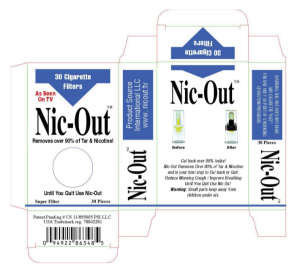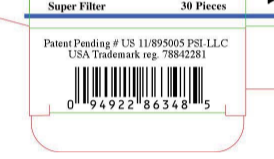I just went on a tirade against the manufacturer-distributor presumption, arguing that the doctrine is meant to apply where “distributor” means “reseller,” not the more complicated case where the so-called “distributor” has some say in how the goods are produced. And here is an example of the relationship the doctrine was meant for—properly applied by the Trademark Trial and Appeal Board and now affirmed in the district court.
I previously reported on the opposition in Nahshin v. Product Source International, LLC. Nahshin is the Israeli manufacturer of a cigarette filter for removing nicotine. Product Source International (PSI) distributed in the US and registered the trademark, but Nahshin eventually petitioned to cancel the registration and won. PSI appealed to the district court under Section 21 of the Lanham Act, 15 U.S.C. § 1071. Nahshin counterclaimed for trademark infringement.
What complicates the situation some is that there was originally a middleman, Safety Aid Supplies (SAS), who was reselling the Nahshin product to PSI. PSI filed its application to register the trademark at a time when PSI claimed to not know that Nahshin was the ultimate source, but thereafter, after ceasing its relationship with SAS, PSI contacted “P. Service,” a name it saw on the containers for the filters, and ultimately ended up with Nahshin. PSI worked with Nahshin to remove the name of SAS as the distributor and to put its own trademark application number (incorrectly called the registration number) on the box, a change that Nahshin willingly made:
But none of that goes to ownership, only remedies. The district court agreed with the Board that Nahshin had enough sales before PSI was in the picture to establish its own common law US trademark rights and after that nothing else mattered.
PSI had a shot at an acquiesence defense because of the package labeling, but there is no acquiescence defense where confusion is “highly likely or inevitable,” that is, “where, as here, there is a strong likelihood of confusion because two parties claim ownership of the exact same mark identifying the exact same product, acquiescence cannot bar a cancellation claim. This is so because the public interest in avoiding confusion in the marketplace must trump any inequity to the party relying on another’s acquiescence.”
But acquiescence did mean that Nahshin wouldn’t be able to collect any damages for the infringement, although it can have PSI enjoined from any further infringement.
Product Source International, LLC v. Nahshin, No. 1:14-cv-18 (E.D. Va. June 24, 2015)



Leave a Reply